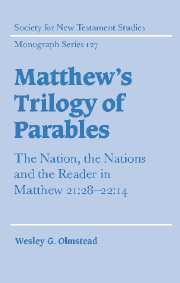Book contents
- Frontmatter
- Contents
- Acknowledgements
- Part one Prolegomena
- Part two The trilogy in narrative-critical perspective
- 3 Jesus' encounter with Israel: the nation, its leaders and their people
- 4 Jesus and the nations: characterisation, plot and the reception of Matthew 21.28–22.14
- 5 A narrative-critical reading of the trilogy
- Part three The trilogy in redaction-critical perspective
- Appendix The text of the parable of The Two Sons
- Notes
- Bibliography
- Index of passages
- Index of selected topics and modern authors
4 - Jesus and the nations: characterisation, plot and the reception of Matthew 21.28–22.14
Published online by Cambridge University Press: 22 September 2009
- Frontmatter
- Contents
- Acknowledgements
- Part one Prolegomena
- Part two The trilogy in narrative-critical perspective
- 3 Jesus' encounter with Israel: the nation, its leaders and their people
- 4 Jesus and the nations: characterisation, plot and the reception of Matthew 21.28–22.14
- 5 A narrative-critical reading of the trilogy
- Part three The trilogy in redaction-critical perspective
- Appendix The text of the parable of The Two Sons
- Notes
- Bibliography
- Index of passages
- Index of selected topics and modern authors
Summary
Each of the parables in this trilogy rehearses the story of Yahweh and Israel. This much seems clear. Whether the nations also have a role in these stories is perhaps less certain. Of whom shall the ἔθνος, to whom the kingdom is transferred, be composed (21.43)? To whom is the final invitation in the parable of the Wedding Feast extended (22.8–10)? Traditionally, Matthean scholars have found in the former an allusion to the church and in the latter veiled reference to the Gentile, or at least universal, mission, but this consensus has recently been challenged. In this chapter we continue the task begun in chapter 3 of bringing the evidence of the wider narrative to bear on these parables. Here, however, we turn our attention to the narrative's characterisation of the nations and to the development of the ‘Gentile sub-plot’ in Matthew's story, asking in both instances how the patterns of the wider narrative help to shape the reader's reception of this trilogy of parables.
The view at the end: the nations and the narrative conclusion (28.16–20)
For most stories, last scenes are of first importance, and this story offers no exception. We have noted the importance of the Passion Narrative for Matthew's portrait of Israel. The final stages of the story are no less important for the narrative's characterisation of the nations. Indeed, at 28.16–20 several of the most important motifs that have been planted like seeds throughout this narrative finally bear fruit and receive climactic articulation.
- Type
- Chapter
- Information
- Matthew's Trilogy of ParablesThe Nation, the Nations and the Reader in Matthew 21:28-22:14, pp. 71 - 97Publisher: Cambridge University PressPrint publication year: 2003



